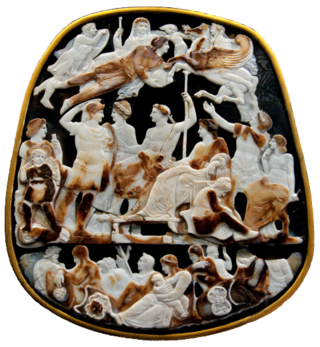Related Research Articles

The Julio-Claudian dynasty comprised the first five Roman emperors: Augustus, Tiberius, Caligula, Claudius, and Nero.

Marcus Antonius, commonly known in English as Mark Antony, was a Roman politician and general who played a critical role in the transformation of the Roman Republic from a constitutional republic into the autocratic Roman Empire.

Around the start of the Common Era, the family trees of the gens Julia and the gens Claudia became intertwined into the Julio-Claudian family tree as a result of marriages and adoptions.

Tiberius Julius Caesar Augustus was a Roman emperor. He reigned from AD 14 until 37, succeeding his stepfather, the first Roman emperor Augustus. Tiberius was born in Rome in 42 BC. His father was the politician Tiberius Claudius Nero and his mother was Livia Drusilla, who would eventually divorce his father, and marry the future-emperor Augustus in 38 BC. Following the untimely deaths of Augustus' two grandsons and adopted heirs, Gaius and Lucius Caesar, Tiberius was designated Augustus' successor. Prior to this, Tiberius had proved himself an able diplomat, and one of the most successful Roman generals: his conquests of Pannonia, Dalmatia, Raetia, and (temporarily) parts of Germania laid the foundations for the empire's northern frontier.
AD 41 (XLI) was a common year starting on Sunday of the Julian calendar. At the time, it was known as the Year of the Consulship of C. Caesar Augustus Germanicus and Cn. Sentius Saturninus. The denomination AD 41 for this year has been used since the early medieval period, when the Anno Domini calendar era became the prevalent method in Europe for naming years.

The gens Claudia, sometimes written Clodia, was one of the most prominent patrician houses at ancient Rome. The gens traced its origin to the earliest days of the Roman Republic. The first of the Claudii to obtain the consulship was Appius Claudius Sabinus Regillensis, in 495 BC, and from that time its members frequently held the highest offices of the state, both under the Republic and in imperial times.
Iullus Antonius was a Roman magnate and poet. A son of Mark Antony and Fulvia, he was spared by the emperor Augustus after the civil wars of the Republic, and was married to the emperor's niece. He was later condemned as one of the lovers of Augustus's daughter, Julia, and killed himself.

Lucius Vitellius was the youngest of four sons of procurator Publius Vitellius and the only one who did not die through politics. He was consul three times, which was unusual during the Roman empire for someone who was not a member of the Imperial family. The first time was in the year 34 as the colleague of Paullus Fabius Persicus; the second was in 43 as the colleague of the emperor Claudius; the third was in 47 again as the colleague of the emperor Claudius.

Octavia the Younger was the elder sister of the first Roman Emperor, Augustus, the half-sister of Octavia the Elder, and the fourth wife of Mark Antony. She was also the great-grandmother of the Emperor Caligula and Empress Agrippina the Younger, maternal grandmother of the Emperor Claudius, and paternal great-grandmother and maternal great-great-grandmother of the Emperor Nero.
Quintus Pomponius Secundus was a Roman aristocrat of the first century, and consul suffectus in AD 41 as the colleague of Gnaeus Sentius Saturninus. His brother was the poet and statesman Publius Pomponius Secundus, and their half-sister, Milonia Caesonia, was the second wife of the emperor Caligula.

Lucius Volusius Saturninus was a Roman senator from the powerful plebeian Volusia gens, or family. He held several offices in the emperor's service. Saturninus attracted the attention of his contemporaries for his long life: he died at the age of 93, and having sired a son at the age of 62.
Lucius Volusius Saturninus, also known as Lucius Volusius was a Roman Senator from the powerful plebeian Volusia gens, or family. He was a cousin of emperor Tiberius.
The gens Vitellia was a family of ancient Rome, which rose from obscurity in imperial times, and briefly held the Empire itself in AD 69. The first of this gens to obtain the consulship was Aulus Vitellius, uncle of the emperor Vitellius, in AD 32.
Gaius Sentius Saturninus was a Roman senator and military officer who was appointed Roman consul in 19 BC. He served as the proconsular governor of Africa, and later as imperial governor of Syria. He then served several times as a senior military officer working with the future emperor Tiberius in campaigns against the Marcomanni, gaining the distinction of being awarded triumphal ornaments. Later he campaigned in Germania and Illyria.
Quintus Volusius also known as Quintus Volusius Saturninus was a senator of the Roman Republic who lived in the 1st century BC.
Volusia Saturnina also known from her funeral inscription as Volusia Latina Saturnina was a Roman noble woman who lived in the Roman Empire in the second half of the 1st century BC and first half of the first century AD.
Lollia Saturnina (c.10-41) was a Roman noble woman who lived in the Roman Empire in the 1st century. She was the sister of the Roman empress Lollia Paulina and was a mistress of the Roman emperor Caligula.
The Volusia gens was an ancient Roman family.
References
 This article incorporates text from a publication now in the public domain : Singer, Isidore; et al., eds. (1901–1906). "Fulvia". The Jewish Encyclopedia . New York: Funk & Wagnalls.
This article incorporates text from a publication now in the public domain : Singer, Isidore; et al., eds. (1901–1906). "Fulvia". The Jewish Encyclopedia . New York: Funk & Wagnalls.